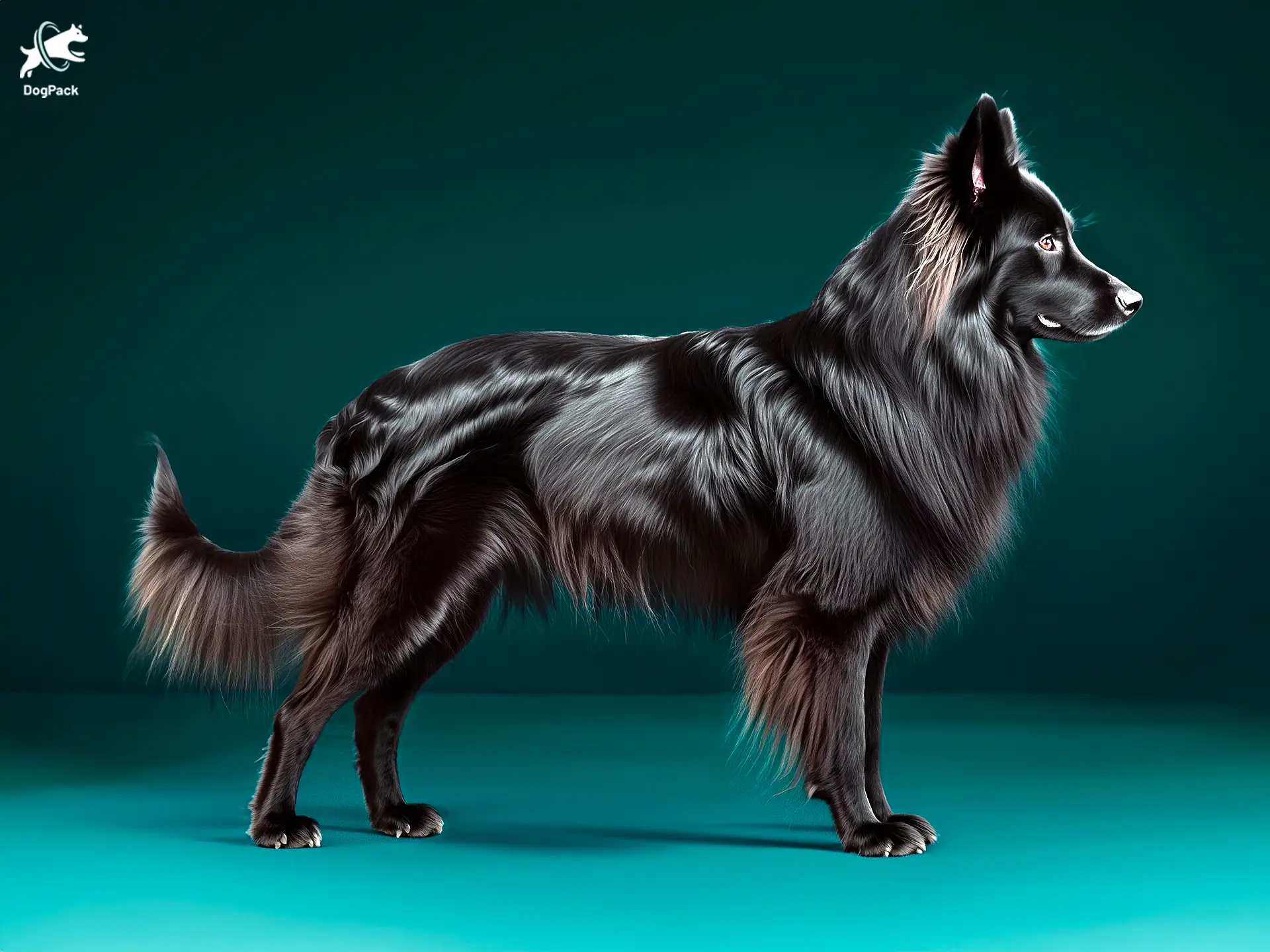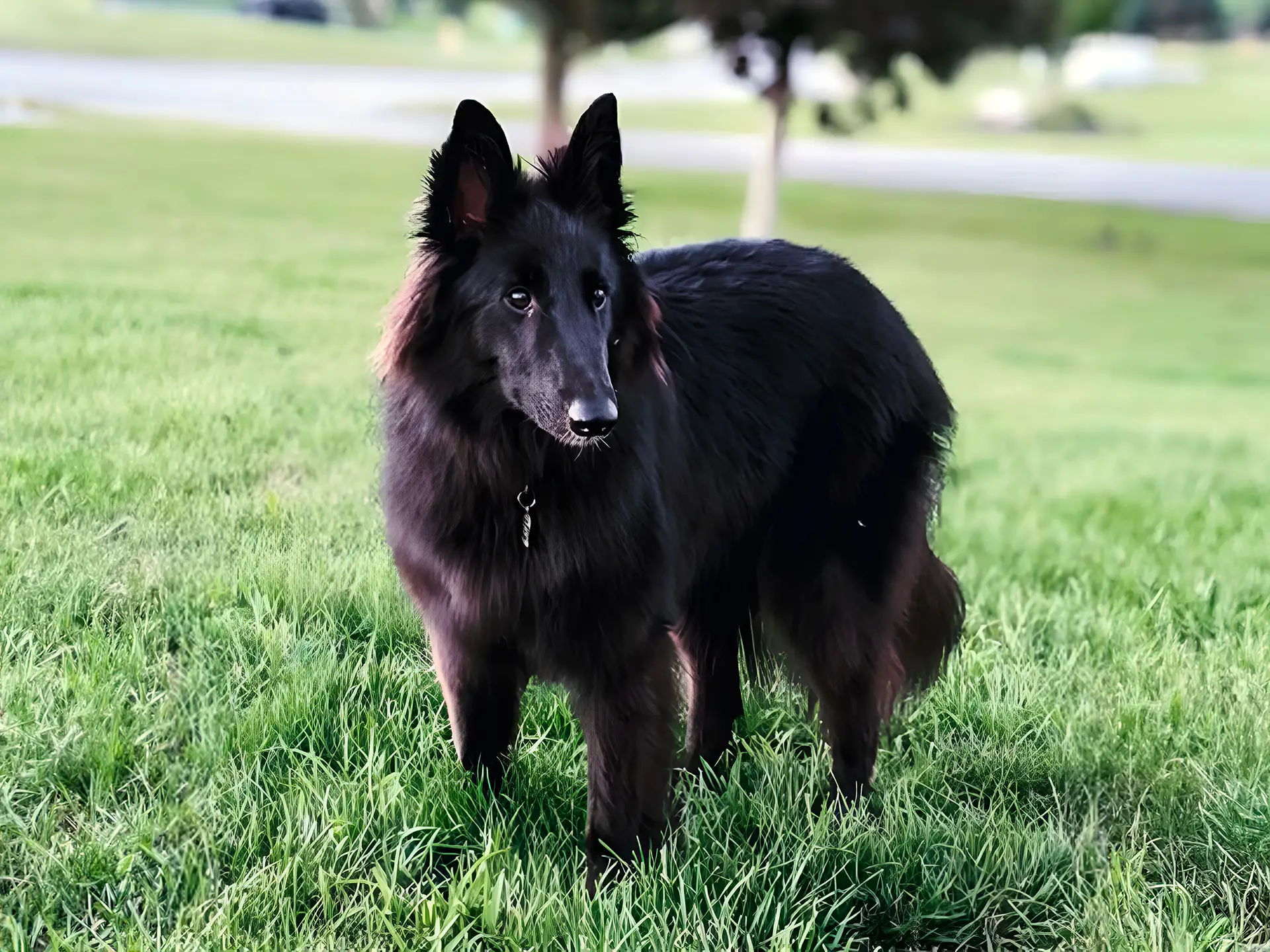Belgian Sheepdog Breed Info & Overview
Picture a dog that combines elegance with strength, intelligence with affection—that’s the Belgian Sheepdog. Known for their sleek black coat and sharp instincts, these dogs are not only outstanding herders but also loyal protectors. Bred for work and companionship, the Belgian Sheepdog thrives in active homes and forms deep bonds with its family. If you’re looking for a versatile, loyal, and energetic partner, this breed stands out as a remarkable companion.
Characteristics
Pictures
Breed History
The Belgian Sheepdog, also known as the Groenendael, hails from Belgium in the late 19th century. Originally bred for herding and guarding livestock, they quickly gained recognition for their versatility and intelligence. This breed is one of four varieties of Belgian herding dogs, each distinguished by coat type and color.
During World Wars I and II, Belgian Sheepdogs served bravely as messengers and ambulance dogs. Their unwavering loyalty and courage made them invaluable on the battlefield. Post-war, their popularity spread as people admired their exceptional working abilities and companionship qualities.
Today, they continue to excel in roles like police and military work, search and rescue, and agility competitions. Their rich history contributes to their strong work ethic and deep bond with humans.
Temperament, Personality
Known for keen intelligence and alertness, this breed is always ready to spring into action. They form deep attachments to their families and are naturally protective, making them excellent watchdogs. Early socialization ensures they are well-mannered around strangers and other animals.
These dogs are energetic and thrive on mental and physical stimulation. They excel in obedience training and canine sports like agility and herding trials. Without sufficient activity, they may become bored and develop undesirable behaviors, so an active lifestyle suits them best.
While affectionate with family members, they can be somewhat reserved with outsiders. Their sensitive nature means they respond best to positive reinforcement rather than harsh corrections. With the right guidance, they make loyal and devoted companions.
Physical Characteristics
Elegant and athletic, the Belgian Sheepdog boasts a well-proportioned body built for agility and endurance. They have a proud carriage and an alert expression that reflects their intelligent nature. Medium to large in size, they present a commanding presence without being overly bulky.
Their most striking feature is a long, thick double coat that’s solid black with possible small white markings. The coat provides protection against harsh weather, a nod to their working heritage. Regular grooming maintains its lustrous appearance and keeps shedding under control.
Distinctive features include a finely chiseled head with a pointed muzzle and erect, triangular ears. Dark brown eyes convey intelligence and devotion. A well-feathered tail adds to their elegant silhouette as it flows gracefully behind them.
Health Issues
Like all breeds, they are prone to certain health conditions. Common issues include hip and elbow dysplasia, which can affect mobility. Regular veterinary check-ups and maintaining a healthy weight help manage these risks. According to the American Kennel Club, responsible breeders screen for these conditions.
Eye problems such as progressive retinal atrophy and cataracts may occur. Early detection through regular eye exams can prevent serious complications. Epilepsy has been reported in some lines, so awareness of any family history of seizures is important.
Providing a balanced diet and regular exercise contributes to overall well-being. Staying informed about potential health concerns ensures a happier, healthier life for your canine companion.
Grooming Needs
With a thick double coat, grooming is essential. Regular brushing—two to three times a week—prevents matting and reduces shedding. During seasonal shedding periods, more frequent brushing is necessary to keep the coat healthy.
Bathing should be done as needed, typically every few months. Using a quality dog shampoo helps maintain natural oils in the coat. Don’t forget to check and clean their ears regularly to prevent infections.
Nail trimming keeps their feet in good condition, especially if they don’t wear them down naturally. Dental hygiene shouldn’t be overlooked; brushing teeth several times a week prevents tartar buildup and promotes fresh breath.
Exercise Requirements
High energy levels mean Belgian Sheepdogs require plenty of daily exercise to stay happy and healthy. Activities like long walks, jogging, and play sessions in a secure area are ideal. They enjoy tasks that challenge them mentally, such as puzzle toys or obedience training.
Participating in dog sports like agility or herding taps into their natural instincts and offers a productive outlet for energy. Being part of the working dog breeds, they thrive when given jobs to do. Regular exercise helps prevent boredom-related behaviors.
A fenced yard is beneficial but not a substitute for interactive exercise. They thrive when spending time with their owners, so incorporating activities that strengthen your bond is important. Consistency in their exercise routine contributes to a well-adjusted pet.
Training Tips
Known for intelligence and eagerness to please, they respond well to positive reinforcement training methods. Treats, praise, and play are effective motivators. Early training establishes good manners and harnesses their natural abilities.
Socialization from a young age is crucial to ensure comfort in various environments. Exposing them to different people, places, and animals reduces shyness or overprotectiveness. Consistent, gentle guidance builds confidence. Resources like the Association of Professional Dog Trainers offer valuable guidance.
Avoid harsh corrections, as they can be sensitive to negative treatment. Focus on rewarding desired behaviors and redirecting unwanted ones. Enrolling in puppy classes or working with a professional trainer benefits both new and experienced owners.
Nutrition, Diet
Feeding a high-quality dog food appropriate for their age, size, and activity level is important. They typically require about three to four cups of food per day, divided into two meals. Monitoring calorie intake helps maintain a healthy weight.
Active dogs benefit from a diet rich in protein to support muscle development and energy needs. Foods containing omega-3 fatty acids promote a healthy coat and skin. Always ensure access to fresh, clean water throughout the day.
Avoid overfeeding and be cautious with treats to prevent obesity. Consulting with a veterinarian provides personalized dietary recommendations. Special considerations may be needed if they have food sensitivities or health conditions affecting nutrition.
Adoption, Breeders
If interested in adding a Belgian Sheepdog to your family, consider breed-specific rescue organizations. Adoption gives a deserving dog a second chance at a loving home. The Belgian Sheepdog Club of America provides resources for rescue and adoption.
For those seeking a puppy, work with reputable breeders who prioritize health and temperament. They should provide health clearances for the parents and allow you to meet them. Visiting the breeding facility offers insights into how puppies are raised.
Avoid purchasing from pet stores or online sellers without detailed information about the puppy’s lineage and care. Responsible breeders are invested in the lifelong well-being of their dogs and offer support even after the sale.
Family Pet?
With a loyal and affectionate nature, they make excellent family pets for active households. They bond closely with family members and enjoy participating in activities. Their protective instincts can be an asset for those seeking a watchdog.
Due to high energy and size, they may be better suited for families with older children who can handle them responsibly. Supervision is recommended when interacting with younger kids to ensure playtime stays safe and enjoyable.
Proper socialization helps them get along with other pets, though herding instincts may lead them to chase smaller animals. Introducing them to other pets gradually fosters harmonious relationships.
Right For You?
Considering their exercise and mental stimulation needs, this breed suits active individuals or families. If you enjoy outdoor activities and can commit to regular training and engagement, they could be a great match.
Apartment living may not be ideal due to size and energy levels. They thrive in homes with space to roam and owners who provide plenty of attention. Without adequate activity, they may develop separation anxiety or destructive behaviors.
Ultimately, if you’re looking for a devoted, intelligent companion who’s both a loving family member and an alert guardian, this breed offers a unique combination of qualities. Careful consideration of their needs ensures a rewarding relationship.
Conclusion
Bringing a Belgian Sheepdog into your life can be a deeply fulfilling experience if you’re prepared for the commitment they require. Their loyalty, intelligence, and protective nature make them stand out among dog breeds. By providing exercise, training, and affection, you’ll gain a devoted companion ready to share in all of life’s adventures.
FAQs
-
Do Belgian Sheepdogs have strong herding instincts?
Yes, Belgian Sheepdogs are natural herders. Their instincts can extend to herding children or even adults during play. While it’s an endearing trait, early training helps manage this behavior in household settings.
-
How much daily exercise does a Belgian Sheepdog need?
Belgian Sheepdogs require at least 90 minutes of vigorous activity daily. Activities like hiking, agility, or herding tasks are ideal. Without proper exercise, they may become bored and exhibit destructive behaviors.
-
How do Belgian Sheepdogs handle cold weather?
Thanks to their thick double coat, Belgian Sheepdogs tolerate cold weather well. They were bred for outdoor work in various climates. However, it’s essential to ensure they’re comfortable indoors and not left outside for prolonged periods in extreme cold.
-
Are Belgian Sheepdogs good for first-time owners?
Belgian Sheepdogs may be challenging for first-time owners. Their high intelligence and energy require experienced handling and consistent training. They thrive with owners who can commit to regular exercise and mental stimulation.
-
How do Belgian Sheepdogs express affection?
Belgian Sheepdogs are known for being loyal and protective. They often follow their owners around, offering quiet companionship or leaning against them for affection. Their bond with family members is deep and built on trust.
Breed Ratings
The Belgian Sheepdog is exceptionally intelligent, making them quick learners and highly trainable companions.
They have a playful side and enjoy interactive games, especially those involving mental challenges or agility.
High energy levels mean they need plenty of daily exercise to keep them happy and prevent boredom.
They shed moderately throughout the year, with heavier shedding during seasonal changes requiring extra grooming.
Their herding instincts can translate to a moderate prey drive; supervision is needed around small animals.
Regular grooming is necessary due to their thick double coat, which can be time-consuming for some owners.
Their eagerness to please and intelligence make them highly trainable with consistent, positive methods.
They prefer being with their family and may develop separation anxiety if left alone for long periods.
They may bark to alert owners of strangers or unusual activity but are not excessive barkers.
Minimal droolers, which is a plus for owners who prefer a cleaner home environment.
With proper socialization, they can get along with other dogs but may be territorial without early training.
Generally healthy but prone to certain genetic conditions; regular vet care is important to maintain wellness.


















